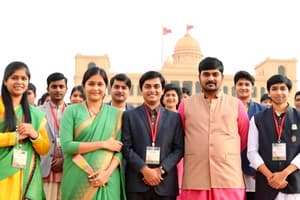Podcast
Questions and Answers
संसद का प्राथमिक कार्य क्या है?
संसद का प्राथमिक कार्य क्या है?
- कानून बनाना (correct)
- कार्यकारिणी की कार्यवाही पर निगरानी रखना
- संविधान में संशोधन करना
- भारतीय समाज के विविध हितों का प्रतिनिधित्व करना
संसद किस प्रकार के वित्तीय अधिकारों का प्रयोग करती है?
संसद किस प्रकार के वित्तीय अधिकारों का प्रयोग करती है?
- केवल उधार लेने का अधिकार
- कर लगाने, उधार लेने और खर्च करने का अधिकार (correct)
- केवल कर लगाने का अधिकार
- केवल खर्च करने का अधिकार
संसद किस प्रकार की संवैधानिक संशोधनों को करने का अधिकार रखती है?
संसद किस प्रकार की संवैधानिक संशोधनों को करने का अधिकार रखती है?
- केवल विशेष बहुमत से
- साधारण या विशेष बहुमत से, दोनों प्रकार से (correct)
- केवल साधारण बहुमत से
- संसद को संविधान संशोधन का कोई अधिकार नहीं है
संसद किस प्रकार की जवाबदेही सुनिश्चित करती है?
संसद किस प्रकार की जवाबदेही सुनिश्चित करती है?
संसद का कौन-सा घर भारतीय समाज के विविध हितों का प्रतिनिधित्व करता है?
संसद का कौन-सा घर भारतीय समाज के विविध हितों का प्रतिनिधित्व करता है?
भारतीय संसद का गठन किसके द्वारा किया गया है?
भारतीय संसद का गठन किसके द्वारा किया गया है?
भारतीय संसद की संरचना किस प्रकार की है?
भारतीय संसद की संरचना किस प्रकार की है?
राज्यसभा के सदस्यों का चुनाव किस प्रकार से होता है?
राज्यसभा के सदस्यों का चुनाव किस प्रकार से होता है?
लोकसभा के सदस्यों का चुनाव किस प्रकार से होता है?
लोकसभा के सदस्यों का चुनाव किस प्रकार से होता है?
राष्ट्रपति की क्या भूमिका है?
राष्ट्रपति की क्या भूमिका है?
निम्न में से कौन भारतीय संसद का हिस्सा नहीं है?
निम्न में से कौन भारतीय संसद का हिस्सा नहीं है?
Flashcards are hidden until you start studying
Study Notes
Indian Polity: Parliament of India
The Parliament of India is an integral part of the Indian political system, serving as the legislative branch responsible for enacting laws, forming governments, and representing the interests of the Indian population. Established by the Constitution of India, the parliament comprises the President of India, the Council of States (also known as Rajya Sabha), and the House of the People (also known as Lok Sabha).
Structure of the Parliament
The Parliament of India is a bicameral legislative body that consists of the President, the Council of States (Rajya Sabha), and the House of the People (Lok Sabha).
-
President: The President is the head of state and holds primarily ceremonial duties, including acting as the first citizen of India and providing assent to bills passed by both houses of Parliament.
-
Council of States (Rajya Sabha): Representing the states of the Indian federation, the Council of States is the upper house in the bicameral structure of the Parliament. Its members are elected indirectly through a state legislative assembly, ensuring representation from different regions and communities.
-
House of the People (Lok Sabha): Also known as the Lower House, Lok Sabha represents the Indian people. Members are directly elected through a popular election held across constituencies throughout the country.
Functions of the Parliament
The primary roles of the Parliament include:
-
Legislation: Parliament passes laws that govern the country, addressing various societal needs and establishing a legal framework for the nation.
-
Exercise Overseeing Powers: By scrutinizing the actions of the executive branch, the Parliament ensures accountability, transparent governance, and checks and balances within the political system.
-
Representation: Both houses of Parliament aim to represent the interests and voices of the diverse Indian society, reflecting regional, cultural, and linguistic differences.
-
Financial Authorities: The House of the People possesses exclusive financial control over taxation, appropriations, public borrowings, and expenditure.
-
Amending the Constitution: The Parliament has the authority to amend the Indian constitution; however, certain amendments require a special majority, while others only need a normal majority.
Studying That Suits You
Use AI to generate personalized quizzes and flashcards to suit your learning preferences.




